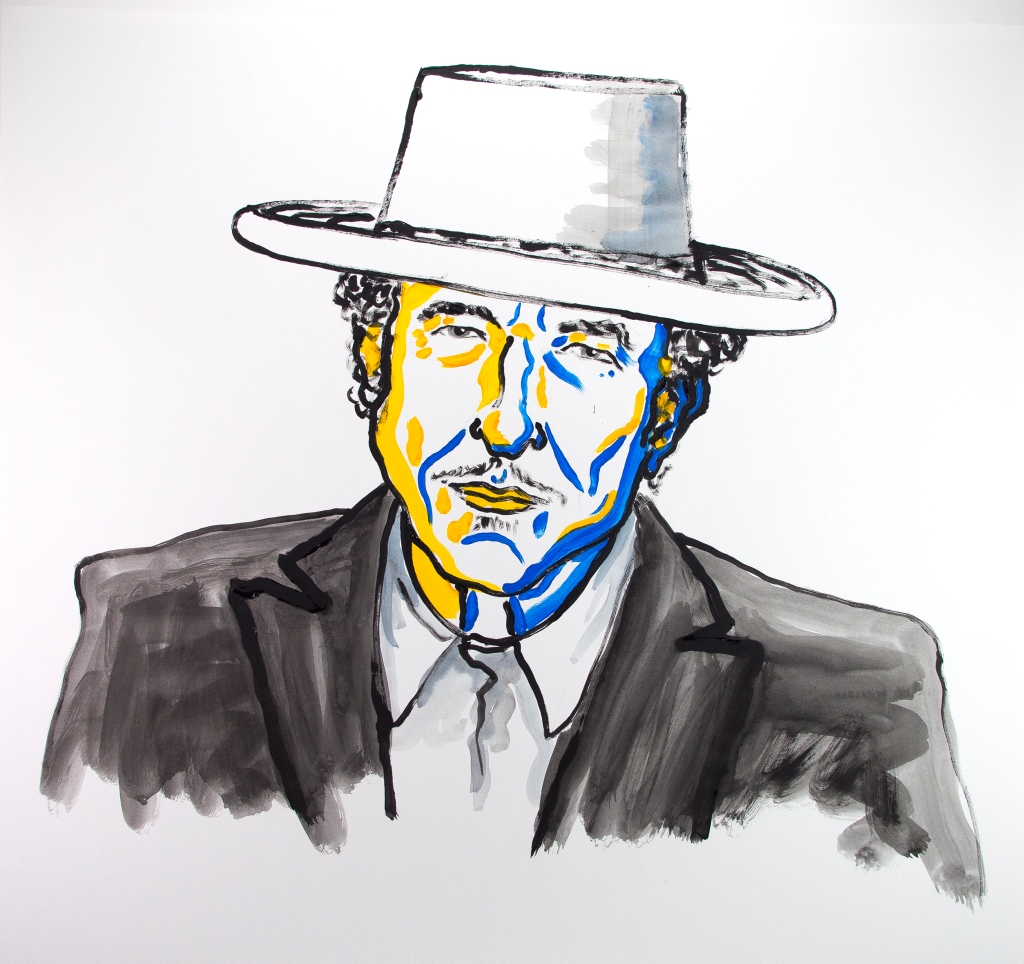
By James Harbeck
There has been much discussion of the Nobel Prize in Literature being awarded to Bob Dylan. I have no interest in weighing in on whether his work is Nobel quality—I won’t pretend to understand the judges’ criteria—but I do have some thoughts on the question of whether a songwriter is even eligible to be awarded the prize.
There is no Nobel Prize in music, or in songwriting. So we can’t say that he should be considered for a different category unless you think songwriting is more appropriate to the Peace Prize, or perhaps to Economics. No, if he’s getting a prize, Literature is it. The question is whether songs qualify as literature—whether, to be frank, they’re good enough, or whether they’re “just songs.” There’s something of a privileged-genre attitude, a white-marble image of literature (that is, the truly worthy kind of text) as being cool prose in dry books that silently dissects humanity’s problems, not in the noise of a musical performance.
This has about as much basis as the white-marble image of Greek statuary, which, we now know, was originally painted bright colours. We ought to remember that the novel, as such, has only existed for a few centuries. Narrative texts pretending to any literary merit were expected to be written in verse until early modern times. And why was that? Because the written literature was, originally, the lyrics of songs and chants and declamations to music. The vaunted Greek drama had not one word that was flatly spoken. The psalms of the Bible were for singing. Beowulf was incomplete without a harp to aid the recitation. The fact that we have peeled the spoken from the sung, and ultimately the silently read from the spoken, does not have any bearing on the human insight conveyed in the words. Poetry has been deemed worthy of the Nobel: Pablo Neruda, Seamus Heaney, and Wole Soyinka have all won it, and it is terrible to think that they might have been ineligible if they had, like Leonard Cohen, been driven by economics to set their poetry to music.
Beyond this is the broader question of what is and is not of artistic merit. I usually avoid the question of what is art because most people pretend to argue about the merits of specific objects while in fact they are jousting with different definitions of “art,” a thing that has no solid discrete objective existence. But it is sometimes necessary to address it head-on. I recall once arguing with fellow doctoral students in drama who were insisting that architecture doesn’t count as art. Why? Because, well, you know, you use it. You do daily life in it. If it’s useful it can’t be art. (I did not agree with the implications this had for drama, either.)
A little attention to history and ethnography teaches a person that in many times and places—and, in fact, in our own, if we would admit it—the category of prettily made useful objects bleeds into the category of beautiful useless objects. Museums are full of beautiful spoons, bowls, cups, and furniture, variously useful, and of awe-inspiring objects made to be used with efficacious intent in religious rituals. The aesthetic inheres in everything. Everything. You can see quite clearly which of your kitchen flatware is pretty and which is plain. You have no trouble making judgements about which buildings are dull and which exciting, which pretty and which ugly, which loaded with clever references and which unendurably trite and self-regarding. None of this is subject to universal agreement; all of it is informed by your own learned tastes and prior experiences. That’s how we evaluate it. That’s how we evaluate everything. We just happen to have come of age in a society that, for some time, has been rich enough to afford items that have no function other than the aesthetic: stimulating responses at leisure and with no real-world sequelae attendant (you can see a frightful scene depicted without needing to call the police, for instance). A kind of learning through emotional inoculation. And we justified this luxury through imputing it to the ancients, who were in reality somewhat different from how we tend to picture them. They painted their statues and buildings, for instance.
Words are like this too. We are editors. We know that all words have flavour, all words have effect, all can carry emotions, all can be as dull and cheap as a dollar-store knife or as fine, bright, and sharp as a ceremonial sword. We may not think of an annual report as having literary merit and yet we can tell the difference between a well-written one that is enjoyable to read and a leaden, deadening, trite, repetitious, obfuscatory one that is made to be a Jersey barrier on the highway to communication. Given the challenge, most of us probably fancy that we could craft an annual report that would have genuine “literary merit” and would give fresh insight into the human condition.
I’d like to think we have no difficulty seeing how popular songs, like popular novels, could be worthy of a prize for the artful use of words. If we’re wondering whether the words are aesthetically effective, Bob Dylan has already given us a criterion: “How does it feel?”
James Harbeck is a web editor, print designer, and trained linguist. Read his blog at sesquiotic.wordpress.com and articles at TheWeek.com.
This article was copy edited by Ambrose Li.
